Choosing Between Laminate and Luxury Vinyl Flooring: What’s Best for Your Home’s Needs?
Luxury Vinyl Flooring vs Laminate: Which is More Durable?
When it comes to renovating your home or choosing materials for a new build, flooring is one of the most significant decisions you'll make. Among the many options available today, laminate flooring and luxury vinyl stand out as popular choices for homeowners seeking the perfect balance of aesthetics, durability, and affordability in their flooring needs. Both these flooring options mimic the appearance of natural materials like wood and stone while offering practical benefits that real hardwood or stone cannot match, making them ideal choices when flooring is a clear consideration.
Understanding the key differences between luxury vinyl and laminate flooring can help you make an informed decision about which type of flooring best suits your lifestyle, budget, and design preferences. While these two flooring types may seem similar at first glance, they differ significantly in composition, installation methods, performance in various environments, and overall longevity, making it important to understand what's the difference before making a decision.
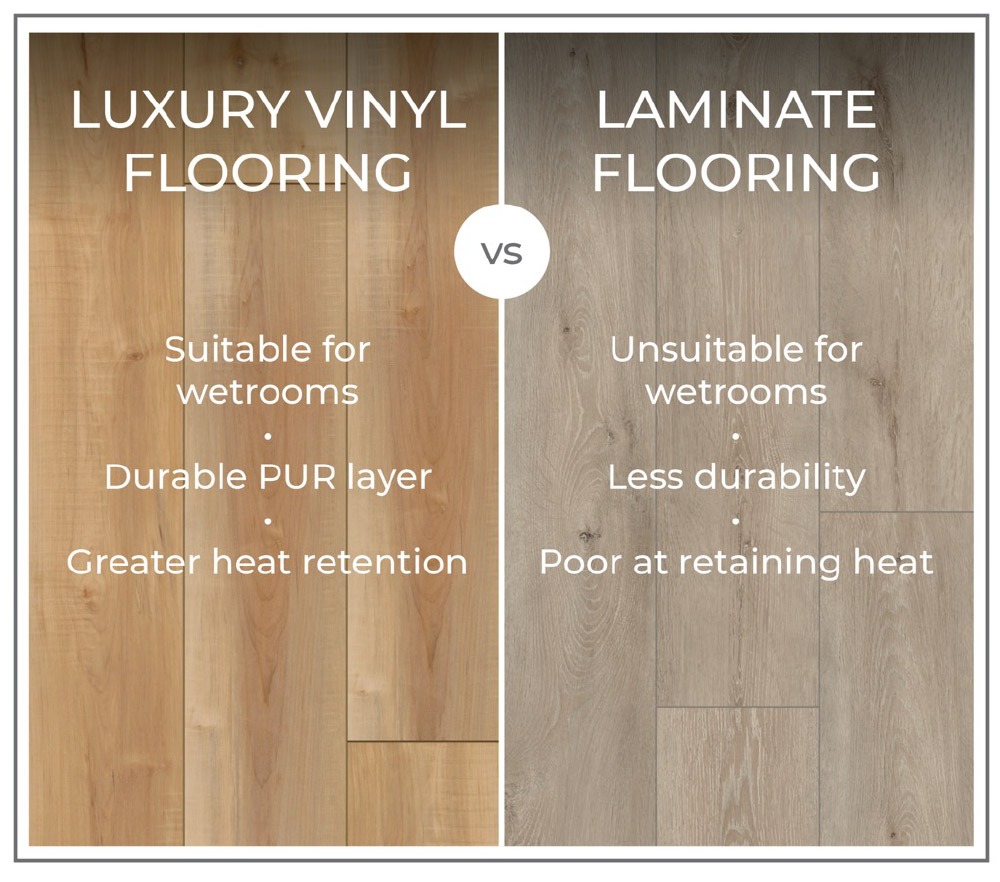
This comprehensive guide will explore the pros and cons of both luxury vinyl plank and laminate, examining factors like water resistance, durability, maintenance requirements, and cost to help you determine whether laminate or luxury vinyl is the right flooring choice for your space.
Laminate vs Luxury Vinyl: Understanding the Basics Of Luxury Vinyl and Laminate Flooring
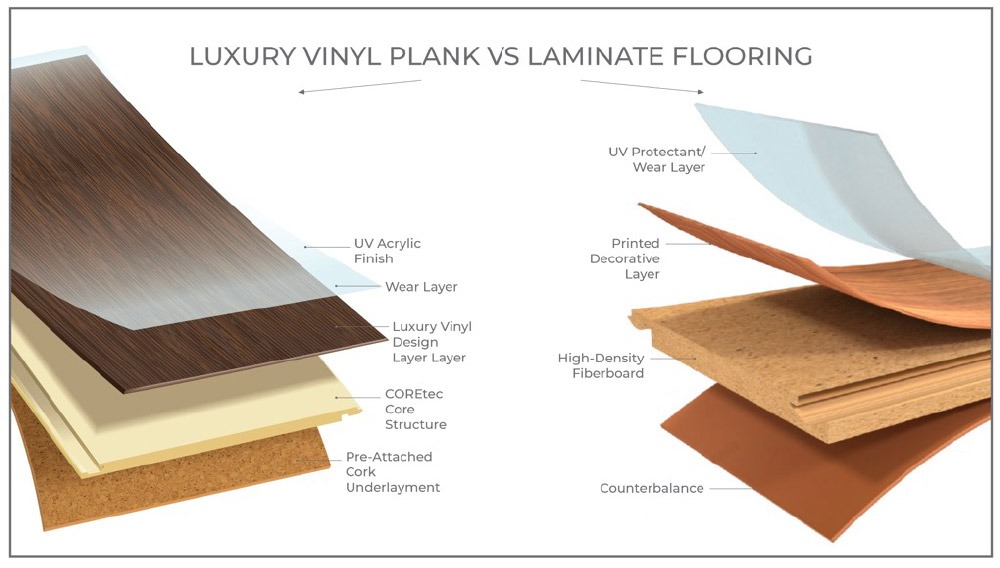
Before diving into the specific advantages and disadvantages of each option, it's essential to understand what laminate and luxury vinyl plank actually are.
Laminate Flooring
- Multiple layers: wear layer, image layer, HDF core, and backing
- Mimics hardwood but more budget-friendly
- Excellent scratch resistance
- Not ideal for moisture-prone areas
Luxury Vinyl Plank (LVP)
- Multi-layered: wear layer, design layer, WPC core, and backing
- 100% synthetic (PVC-based)
- Highly water-resistant and flexible
- Convincingly mimics wood and stone textures
Luxury Vinyl vs Laminate: Composition and Construction
The fundamental difference between laminate and luxury vinyl lies in their composition, which is essential knowledge because flooring is a clear distinction in the market. Laminate flooring is made with a core of wood byproducts compressed at high temperatures with resins. This core provides rigidity and stability to the flooring. The photographic layer of laminate is sealed with a transparent wear layer that protects against scratches, stains, and fading. Laminate flooring typically has a more rigid feel underfoot compared to luxury vinyl plank flooring.
Luxury vinyl flooring is made from 100% synthetic materials, primarily PVC (polyvinyl chloride). Luxury vinyl plank flooring features a more sophisticated construction than standard luxury vinyl tile or sheet vinyl. The luxury vinyl core provides flexibility and resilience, while the wear layer determines its durability against scratches and stains. Higher-quality LVP flooring will have a thicker wear layer, measured in mils, offering greater protection against daily wear and tear. The flexible nature of luxury vinyl options makes this flooring type more forgiving on uneven subfloors than laminate.
Laminate vs Luxury Vinyl Flooring: Water Resistance
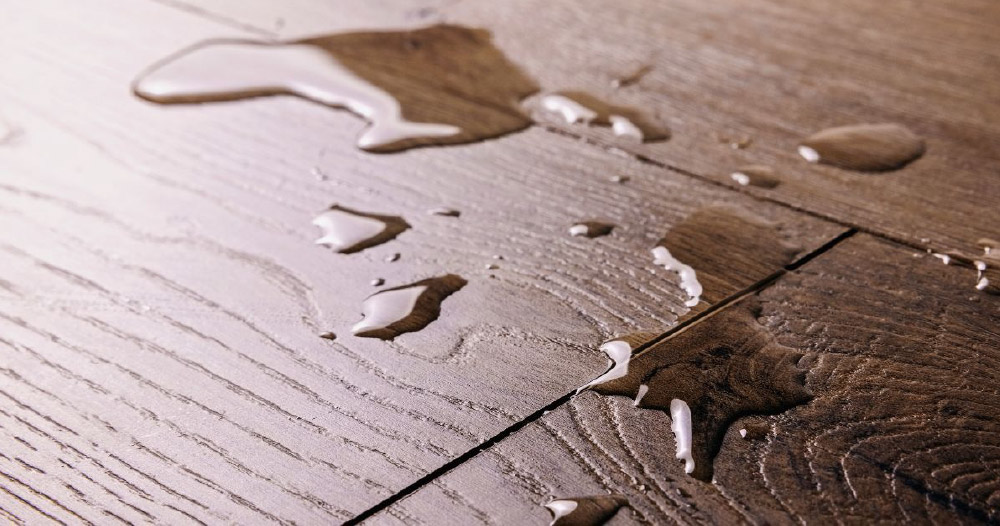
One of the key differences between laminate and luxury vinyl flooring is their resistance to moisture, which is crucial for homeowners to consider when choosing flooring and luxury vinyl plank. Traditional laminate flooring is not waterproof and can swell, warp, or buckle when exposed to excessive moisture. While newer versions of laminate may offer improved water resistance, they still cannot match the waterproof capabilities of luxury vinyl, making it clear what’s the difference in performance between these two types of flooring. This makes laminate less suitable for bathrooms, kitchens, or basements where water exposure is likely.
Luxury vinyl vs laminate flooring in moisture-prone areas shows a clear winner: luxury vinyl flooring is waterproof. Unlike laminate, luxury vinyl plank flooring won't swell or warp when exposed to water, making it an ideal choice for any room in the house, including bathrooms and basements, and clearly illustrating the difference in performance between these two types of flooring.
The 100% synthetic material construction of luxury vinyl planks provides superior protection against moisture damage. If you're choosing between luxury vinyl or laminate flooring for areas prone to spills or humidity, luxury vinyl flooring and laminate flooring comparison reveals that luxury vinyl is a better choice for moisture resistance.
Luxury Vinyl and Laminate: Durability and Longevity
When comparing the durability of laminate and luxury vinyl, several factors come into play, making it evident that flooring is a clear consideration in terms of longevity. Laminate offers excellent resistance to scratches and dents due to its hard surface. The wear layer of quality laminate can withstand heavy foot traffic, making it suitable for busy households. However, laminate's weakness is its susceptibility to moisture damage, which can significantly reduce its lifespan in certain environments, highlighting the importance of understanding the differences between these two types of flooring.
Luxury vinyl plank flooring presents outstanding durability characteristics as well, making it a preferred choice over laminate flooring. The wear layer of LVP flooring protects against scratches, stains, and fading. Unlike laminate, LVP is durable in wet environments and can handle temperature fluctuations better. When properly installed and maintained, luxury vinyl plank and laminate can both last 10-20 years, though luxury vinyl tends to have a slight edge in longevity due to its superior moisture resistance. Comparing laminate and LVP flooring in terms of overall durability often comes down to the specific conditions of your space.
Laminate and Luxury Vinyl Flooring: Installation Methods
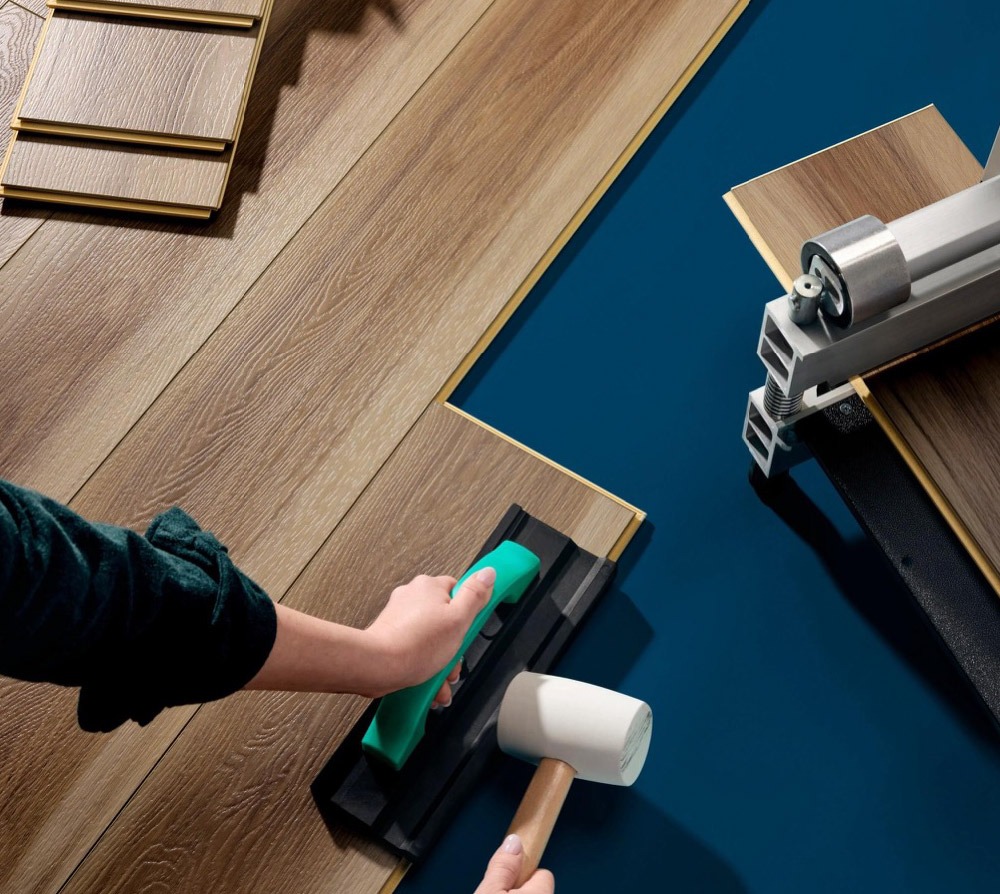
Installing laminate flooring typically involves a floating floor system where planks lock together over a foam underlayment without being attached to the subfloor. This click-lock system makes laminate and luxury vinyl planks relatively straightforward for DIY installation, which is a significant advantage for those looking to choose laminate or like luxury vinyl options. Laminate requires expansion space around the perimeter to accommodate natural expansion and contraction with temperature changes.
Luxury vinyl plank flooring offers more installation flexibility than laminate. Like laminate, luxury vinyl plank flooring often utilizes a floating click-lock system, but there are also glue-down options available. Luxury vinyl flooring is also more forgiving on uneven subfloors, whereas laminate flooring is best installed on a perfectly level surface. When choosing between luxury vinyl or laminate, installation requirements should be considered based on your subfloor condition and DIY comfort level.
Luxury Vinyl vs Laminate Flooring: Comfort and Acoustics
The feel underfoot differs significantly between these two flooring types. Laminate plank tends to be harder and less forgiving than luxury vinyl, which can make standing for long periods less comfortable when considering flooring for your home, especially when flooring is a clear priority for comfort. However, laminate offers better insulation properties, helping to maintain room temperature. Without proper underlayment, laminate can produce a hollow sound when walked upon.
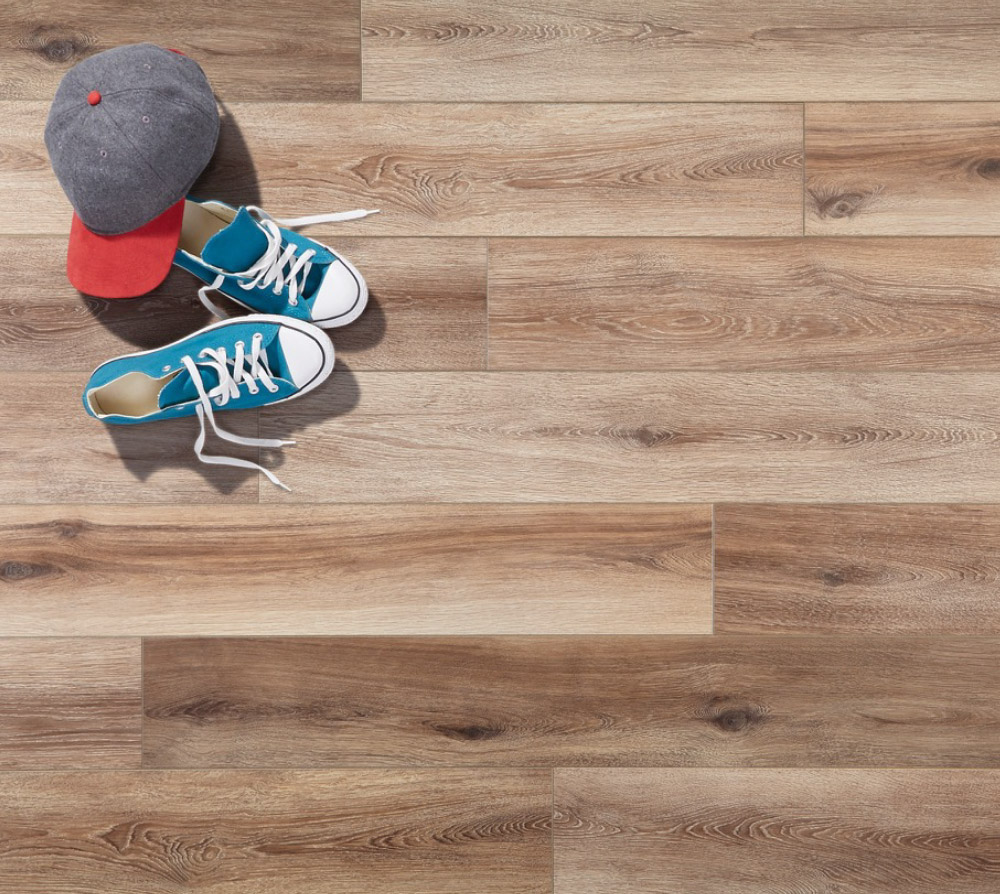
Luxury vinyl flooring is generally softer and more comfortable underfoot than laminate and luxury vinyl, showing that flooring is a clear factor in home comfort. The flexibility of luxury vinyl planks provides a slight cushioning effect, making it more comfortable for extended standing. Using quality underlayment with either flooring option can significantly improve both comfort and acoustic properties, illustrating that flooring is a clear element of a well-designed space.
Key Differences Between Laminate and Luxury Vinyl
A comprehensive comparison reveals several key differences between these popular flooring choices.
Laminate Flooring
- Offers strong scratch resistance due to a durable wear layer
- Often provides a more authentic wood-like appearance in certain styles
- Generally more affordable than luxury vinyl plank
- Easy to clean and maintain with regular care
- Not waterproof — susceptible to swelling and damage from moisture
- A good option for homeowners on a budget looking for hardwood aesthetics in dry spaces
Luxury Vinyl Flooring (LVP)
- Fully waterproof, making it ideal for moisture-prone areas like kitchens and bathrooms
- More flexible and forgiving on uneven subfloors
- Modern designs can closely replicate natural hardwood in both look and texture
- Softer and more comfortable underfoot compared to laminate
- Quieter in terms of footfall noise, especially with proper underlayment
- More durable in environments with high moisture, traffic, or pets
For those choosing between luxury vinyl and laminate, it's worth noting that luxury vinyl flooring is also quieter, more comfortable underfoot, and often more durable in high-moisture environments, making it a popular flooring choice for modern homes.
Aesthetic Considerations Of Luxury Vinyl Or Laminate Flooring
Both flooring options offer excellent aesthetic versatility, designed to mimic the appearance of natural materials like solid hardwood. Laminate flooring typically has a more authentic embossing that aligns with the printed wood grain pattern, creating a realistic texture that can look like hardwood. Higher-end laminate can be difficult to distinguish from real wood flooring at a glance.
Luxury vinyl plank has made tremendous strides in visual realism, making it a top choice among new flooring options. Modern LVP flooring features detailed embossing and high-definition printing that can closely resemble natural hardwood. Luxury vinyl planks and laminate both come in a wide range of colors, wood species imitations, and finishes, from distressed to hand-scraped textures, demonstrating that flooring is a clear avenue for customization. When deciding between laminate and luxury vinyl plank, consider viewing larger samples in your actual space to determine which flooring and laminate or luxury vinyl option best complements your interior design.
Luxury Vinyl Plank and Laminate: Environmental Impact
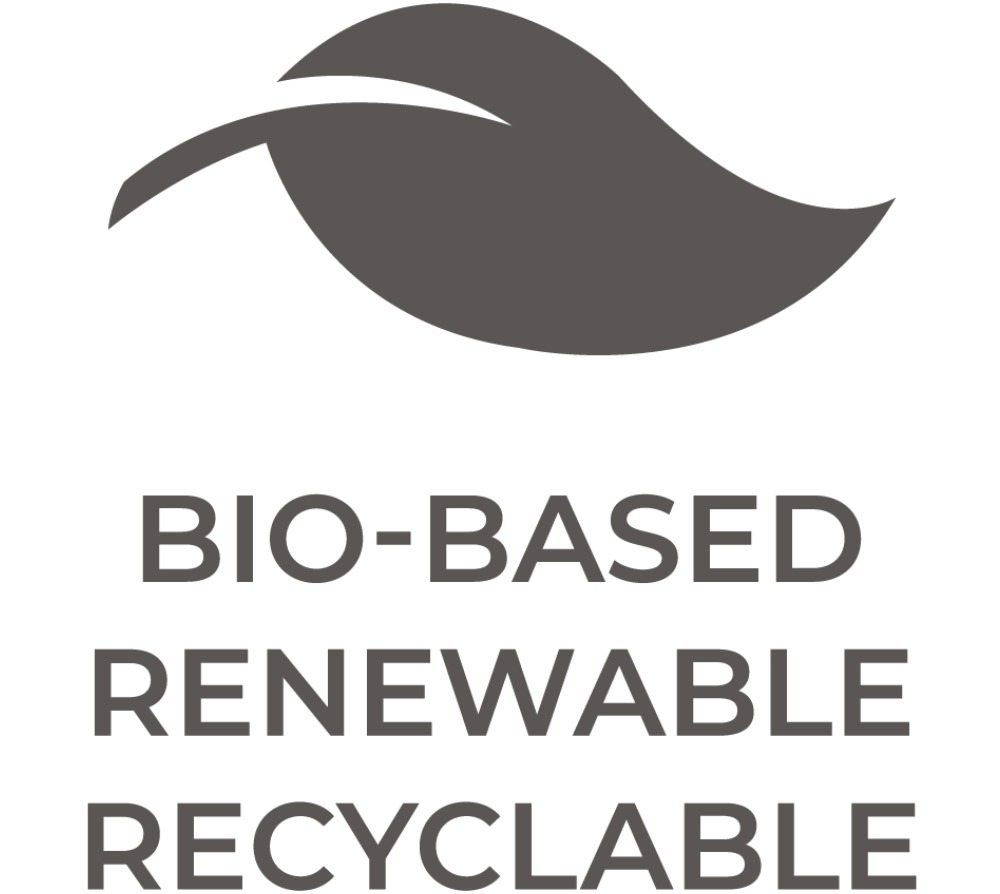
Environmental considerations are increasingly important for homeowners choosing the right flooring. Laminate flooring is primarily made from wood byproducts, making it more biodegradable than luxury vinyl, which shows how flooring is a clear choice for environmentally-conscious consumers.. Neither laminate nor luxury vinyl is considered particularly eco-friendly compared to natural materials like real hardwood or bamboo.
Laminate and Luxury Vinyl Plank: Cost Comparison
Price is often a deciding factor when choosing between laminate and LVP flooring. Generally, laminate flooring is less expensive than luxury vinyl plank, with standard laminate ranging from $2.49-3 per square foot, while mid-range options may cost $3-$5 per square foot. Premium laminate products that closely resemble hardwood flooring can be more expensive than basic LVP, which highlights how flooring is a clear investment in your home.
Luxury vinyl plank flooring tends to be more expensive than laminate, typically starting around $2-$5 per square foot for basic options and ranging up to $7-$12 for premium products. The total cost of either flooring choice should include underlayment, installation materials, and labor if professional installation is preferred. While laminate may have a lower upfront cost, considering the longevity and performance in your specific environment may make luxury vinyl a more cost-effective long-term flooring solution despite being more expensive than laminate initially.
Types of Luxury Vinyl Flooring vs Laminate Options
The flooring market offers various formats for both materials. Laminate flooring is typically available in plank format, mimicking hardwood flooring, though tile looks are also available, showing that flooring is a clear reflection of personal taste. Laminate planks come in various thicknesses, with thicker options generally offering better durability and sound insulation, similar to what you might find in like luxury vinyl products.
Vinyl flooring comes in several forms: sheet vinyl (sold in large, continuous sheets), luxury vinyl tile individual squares), and luxury vinyl plank (LVP). Each of these types of vinyl flooring serves different needs and preferences. Sheet vinyl is economical and completely waterproof but looks less like natural material. Luxury vinyl tile can mimic ceramic or stone. Luxury vinyl plank flooring, the most popular choice for comparison with laminate, offers the most realistic wood appearance and superior performance characteristics, reinforcing the idea that flooring is a clear choice for quality. Understanding these various flooring types will help when choosing between vinyl and laminate for your project, emphasizing that flooring is a clear decision-making factor.
Choosing Between Luxury Vinyl and Laminate: Room-by-Room Analysis Of Laminate or Luxury Vinyl
Different rooms have different requirements, making certain flooring types, like luxury vinyl, more suitable than others. For living rooms and bedrooms, both laminate and luxury vinyl can work well, though laminate may offer a slightly more authentic wood appearance, indicating that flooring is a clear choice for style. In these lower-moisture environments, laminate offers excellent performance and can be less expensive than premium luxury vinyl options.
For kitchens, bathrooms, and basements, the waterproof properties of luxury vinyl make it a superior choice to laminate. Luxury vinyl flooring is made to withstand occasional spills and humidity without damage. While some newer laminate products advertise water-resistant properties, they still cannot match the waterproof capabilities of luxury vinyl plank flooring, which emphasizes that flooring is a clear factor in moisture-prone areas.
When choosing the right flooring for moisture-prone areas, luxury vinyl is generally recommended over laminate. For homes with pets, luxury vinyl's water resistance and durability often make it preferable to laminate flooring, which may show wear more quickly from pet accidents and scratches, showcasing the difference between these two types of flooring.
Flooring Pros and Cons: Making Your Final Decision
When weighing laminate vs luxury vinyl flooring, consider your specific needs, budget, and preferences. Laminate flooring is best for dry areas where you want the look of wood at a lower price point. It offers excellent scratch resistance, is relatively easy to install, and can be less expensive than LVP. However, laminate's vulnerability to moisture and inability to be refinished are significant drawbacks when considering laminate flooring and luxury vinyl.
Luxury vinyl plank flooring shines in versatility and durability across all environments. Its waterproof nature makes it suitable for any room in the house, and its comfort underfoot exceeds that of laminate. While typically more expensive than laminate, LVP often provides better long-term value, especially in households with children, pets, or in moisture-prone areas. By carefully evaluating the flooring pros and cons against your specific needs, you can determine whether luxury vinyl or laminate flooring will be the better flooring option for your space.
Conclusion
Both laminate and luxury vinyl plank flooring offer compelling alternatives to natural hardwood, each with distinct advantages depending on your specific needs and circumstances. The key differences between laminate and luxury vinyl primarily revolve around water resistance, comfort, durability, and price.
For dry living spaces where budget is a primary concern, laminate flooring offers excellent value and appearance compared to other flooring materials, including options like luxury vinyl. For versatility across all rooms, including moisture-prone areas, luxury vinyl plank provides superior performance characteristics despite a typically higher price point.
By considering factors such as installation requirements, room usage, aesthetic preferences, and maintenance capabilities, you can confidently choose between luxury vinyl and laminate to find the right flooring solution that will serve your home beautifully for years to come.
